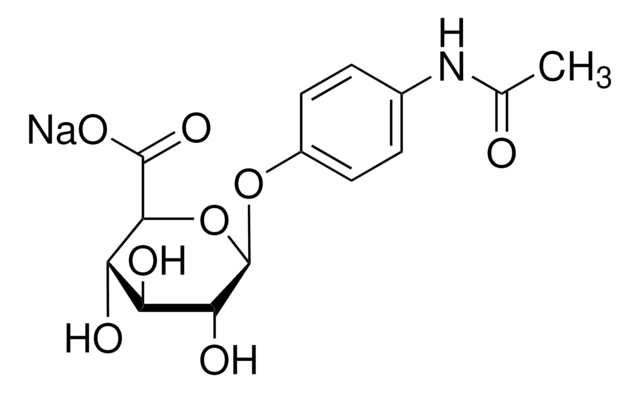A-064
Acetaminophen solution
1.0 mg/mL in methanol, ampule of 1 mL, certified reference material, Cerilliant®
About This Item
Recommended Products
grade
certified reference material
Quality Level
form
liquid
feature
SNAP-N-SPIKE®, SNAP-N-SHOOT®
packaging
ampule of 1 mL
manufacturer/tradename
Cerilliant®
concentration
1.0 mg/mL in methanol
technique(s)
gas chromatography (GC): suitable
liquid chromatography (LC): suitable
application(s)
forensics and toxicology
format
single component solution
storage temp.
−20°C
SMILES string
CC(=O)Nc1ccc(O)cc1
InChI
1S/C8H9NO2/c1-6(10)9-7-2-4-8(11)5-3-7/h2-5,11H,1H3,(H,9,10)
InChI key
RZVAJINKPMORJF-UHFFFAOYSA-N
Gene Information
human ... FAAH(2166) , PTGS1(5742) , PTGS2(5743) , TRPV1(7442)
General description
This substance is listed on the positive list of the EU regulation 10/2011 for plastics intended to come into contact with food. Find all available reference materials for compounds listed in 10/2011 here
Application
- Enhanced removal of acetaminophen from aqueous solutions: A study utilized kumquat peel-derived biochar supporting zeolitic imidazole framework-67 (ZIF-67) to improve peracetic acid activation for acetaminophen removal, demonstrating an innovative approach to wastewater treatment (Nguyen et al., 2024).
- Co-doped biochar for acetaminophen degradation: Research on Cu/N co-doped biochar activating peroxymonosulfate (PMS) revealed a non-radical degradation pathway for acetaminophen dominated by singlet oxygen and electron transfer, providing insights into sustainable environmental cleanup technologies (Wu et al., 2024).
- Biodegradation of pharmaceuticals including acetaminophen: A study on anaerobic co-metabolic biodegradation of pharmaceuticals and personal care products highlighted glycerol fermentation as a driving mechanism, offering a feasible strategy for managing environmental contamination from substances like acetaminophen (Carneiro et al., 2024).
Legal Information
Signal Word
Danger
Hazard Statements
Precautionary Statements
Hazard Classifications
Acute Tox. 3 Dermal - Acute Tox. 3 Inhalation - Acute Tox. 3 Oral - Flam. Liq. 2 - STOT SE 1
Target Organs
Eyes
Storage Class Code
3 - Flammable liquids
WGK
WGK 2
Flash Point(F)
49.5 °F - closed cup
Flash Point(C)
9.7 °C - closed cup
Certificates of Analysis (COA)
Search for Certificates of Analysis (COA) by entering the products Lot/Batch Number. Lot and Batch Numbers can be found on a product’s label following the words ‘Lot’ or ‘Batch’.
Already Own This Product?
Find documentation for the products that you have recently purchased in the Document Library.
Customers Also Viewed
Our team of scientists has experience in all areas of research including Life Science, Material Science, Chemical Synthesis, Chromatography, Analytical and many others.
Contact Technical Service












